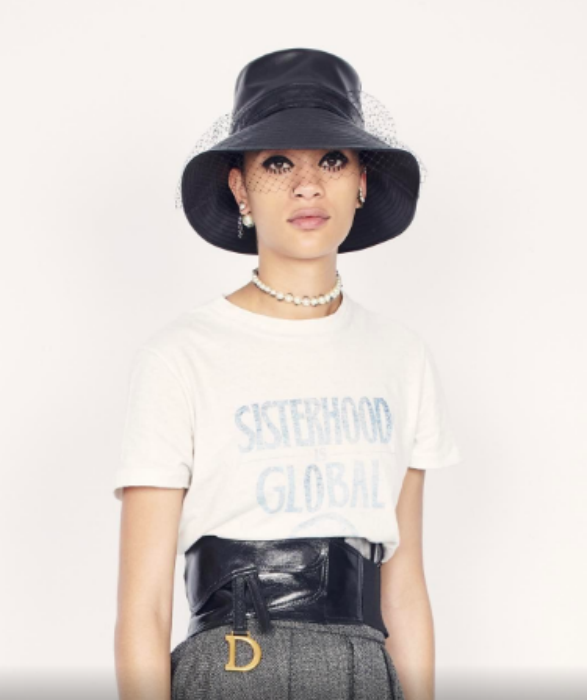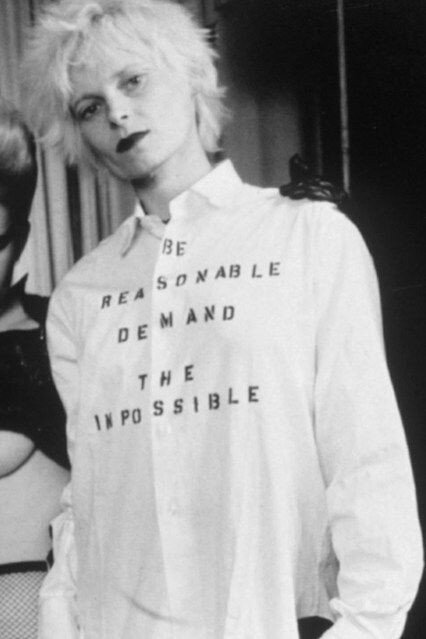T-shirts That Talk And How Slogan Fashion Speaks To Change
DIOR; Source: https://aeworld.com/fashion/dior-sisterhood-is-global-t-shirt-explained-robin-morgan/
Lately, I have been witnessing the more obvious “comeback” of the slogan T-shirt in high fashion. It is obvious enough that when you wear a slogan T-shirt, you are telling the world, more directly, what you want the world to know about you and what you stand for.
But why is it that “now” we want to speak more directly to the world? I think the answer is more than obvious. We are amid social, economic, environmental, and political turbulence. “Out with the old, and in with the new” sort of moment.
So where does a T-shirt come in given the context of our present moment? Recall the punk era of the 70-ties, which came as a reaction to the socio-economic inequalities, racism, and the establishment.
It is at this time that Vivienne Westwood started putting punk-slogans, such as “Too fast to live, too young to die”, and jarring words, such as “PERV”, “SCUM”, “DESTROY” on a T-shirt.
To this day, Westwood remains loyal to words on T-shirts as a call for activism and solution-seeking concerning pressing geopolitical problems.
Source: https://www.dazeddigital.com/fashion/article/24335/1/vivienne-westwood-s-top-ten-political-moments
For someone fascinated by the under-explored potentials of language serving as a medium of promoting sustainability in fashion and beauty, such as myself, a slogan T-shirt is an interesting example where fashion and language converge. They are both intimately related to people’s values, thoughts, and personalities.
The T-shirt also represents a symbiosis of disparities: it is so simple in design, and yet it is a powerful, and thought-provoking tool for social activism. Undeniably, words demand immediate attention.
As a feminist writer, Chimamanda Ngozi Adichie beautifully puts it, in the view of, now famous, Dior’s show featuring T-shirt printed with the title of her essay “We should all be feminists”, a slogan T-shirt gives a voice to a generation that does not have the language to express emotions, thoughts, and values that are a part of their experience.
So what are the shared experiences of a generation shifting to sustainable fashion, such that the experiences are represented by pieces of language on a T-shirt? Here are some insights from luxury fashion brands.
EMPOWERMENT OF BLACK QUEERNESS
In collaboration with Helmut Lang, called Helmut Language, Willie Norris uses graphic minimalism, which is a staple of the brand, on deadstock materials to celebrate black queerness.
He says about his relationship with slogan T-shirts, “It is not a slogan tee for the sake of sloganeering, it’s a message you can read, debate, interpret and carry like a guiding light.” For Norris, the slogan T-shirt is providing a system for marginalized groups to “channel their voice.”
Norris says that language has been a tool for fighting oppression through generations, and as a designer, he sees himself as providing “a piece of armor, reminding the wearer what they stand for in the world.”
EXTENDING BOUNDARIES OF TRADITIONAL MASCULINITY
Inspired by an American writer and singer Richard Hell’s “psychopaths” or words that are misheard or misread due to either shared spelling or sound similarity, Alessandro Michele of Gucci prints “psychopts” on a slogan T-shirt in a Fall/Winter 20/21 men collection. Hell’s “psychopts”, more commonly known as “slips of the tongue” are interesting, in Hell’s perspective, because they reveal something much deeper hidden in a subconscious, Freudian mind
Keith Helfrich @keithhelfrich
In the gender-fluid collection, which according to Michele, “explores the boundlessness of masculinity”, T-shirts appear with word pairs, such as think/thank, and impotent/impatient with one word printed one on top of the other (another interesting linguistic feature of the collection is printing “FAKE” on a trademark Gucci bag).
What “subconscious ideas” do these T-shirts tap into? Consider, for instance, the think/thank pair. Given Gucci’s dedication to ethical, purposeful, and sustainable fashion (e.g. Gucci Equilibrium program), the 'think' part of the think/thank pair could be read as a call to brainstorm solutions to overcome the negative impact of the fashion industry on the environment.
The “thinking” in the context of sustainability is intimately linked to gratefulness that we still have a window of opportunity to improve, which is the 'thank' part. Furthermore, as we wait impatiently amidst the COVID-19 pandemic for the return of our beloved and cozy “normalcy”, we fall into the trap of becoming “impotent” or creatively stagnant, which is how impotent/impatient speaks to me.
Creative stagnancy is far from what describes the Gucci Maison during the pandemic and under the creative direction of Michele. That a fashion show can be re-created in ways that were inconceivable before the pandemic is something that is Michele’s specialty.
For more information, check out the Gucci fest, or the mini-series directed by Gus Van Sant in collaboration with Michele.
WOMEN EMPOWERMENT
As I mentioned previously, Maria Grazia Chiuri of Dior uses a slogan T-shirt to women empower as the antithesis to patriarchy. In addition to Chimamanda Ngozi Adichie’s “We should all be feminists”, Dior Spring 17 features T-shirts with printed feminist writer Robin Morgan’s book title “Sisterhood is global.”
It is not a promotion of radical feminism, mind you, but rather it is “an exploration of femininity”, which continues in Autumn/Winter 20/21 with a printed T-shirt statement, such as “I say I”, jolting you to think what feminism means to an individual woman.
Through her collections, Chiuri collaborates with female artists, such as scenographer Claire Fontaine, and reflects on females who supported female artists in the past, such as Pamela Buccarelli, a former director of the National Gallery of Modern Art in Rome.
DIOR; Source: https://aeworld.com/fashion/dior-sisterhood-is-global-t-shirt-explained-robin-morgan/
SLOGAN T-SHIRT DECIPHRES “SUSTAINABILITY”
“Sustainability”, as I wrote elsewhere, is a laden term, which fuses many concepts and that is why this word is so hard to define (and, therefore, it is easy to abuse in greenwashing, for example). Here’s where a slogan T-shirt comes in handy. As the voice of the generation, the slogan T-shirt offers insights into how “sustainability” is understood in luxury fashion.
I will conclude with some food for thought. If a T-shirt gives voice to a generation to express their experiences for which they lack the proper language, echoing Adichie, does this mean that we have the language to talk sustainability?
Yes and No. Words, such as upcycling, circularity, clean, eco, transparency have entered our daily fashion lexicons, but these words, as well as many others, remain to be properly defined by linguists and other experts in the field.
Otherwise, we, the mindful and observant fashion collaborators (I purposefully avoid the word “consumers”) and fashion aficionados are subject to greenwashing, and marketing manipulation that may take our purchasing power away from us.
HOW DO YOU FEEL ABOUT FASHION?
COMMENT OR TAKE OUR PAGE READER SURVEY
Featured











The Sarabande Foundation is bringing its acclaimed career fair program "What Now?" to the Big Apple